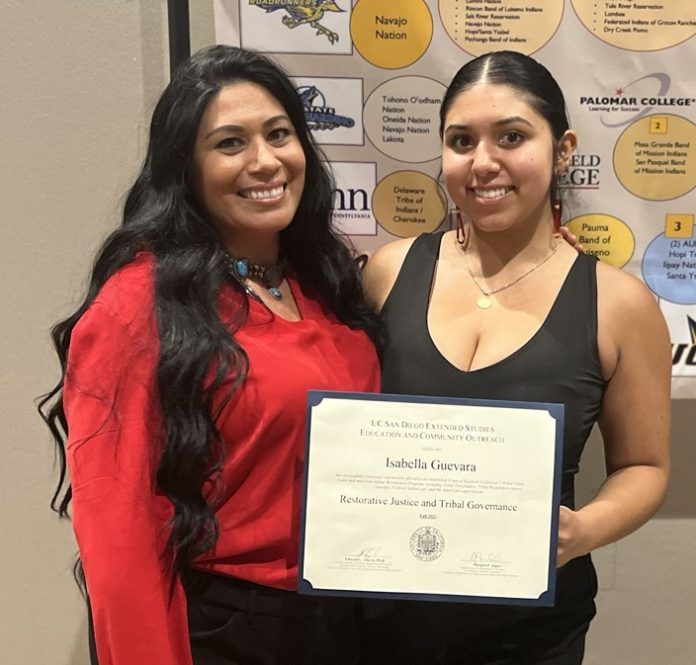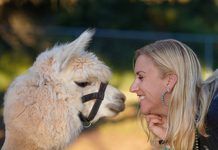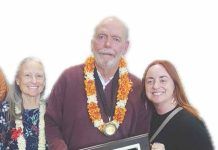The department of Education and Community Outreach at UC San Diego is working with the American Indian Recruitment program in providing young Native American students the opportunity to learn about restorative justice practices empowering them to engage in these practices in service of their communities.
AIR co-founder Devon Lomayesva of the Iipay Nation of Santa Isabel said initially, the AIR program was created to San Diego County tribes’ youth and Urban Indian youth, but has expanded to serve Riverside County, and with virtual opportunities is continuing to branch out further. Lomayesva said the program is 30 years old, with its mission changing and expanding over the years.
“At its heart, AIR is a program designed with the aim of providing opportunity to get more Native American youth an entire education. Goals were increasing high school graduates so they can get into higher education, providing positive alternatives after school. Originally, the program was an after-school program where students engaged in positive activities by learning about college systems, but also receiving tutoring so they can be successful in high school. And, to meet other Native American youth and learn about native topics. It is not just an after-school program. It is a designed program each semester or in summer, or if you are taking our courses. We like to focus on native topics, while exposing the youth to college campuses and college opportunities,” she said. “It is very native based content because they do not get that in the school system, and we find using native content in the programming we offer, students are more interested because it is more about them.”
Launching in 2021, the Intertribal Court of Southern California Tribal Youth Court aims to cultivate wellness-based responses to offenses by tribal youth utilizing peer decision-makers. The TYC centers on educating tribal youth about tribal restorative justice practices and empowers them to engage in these practices in service of their communities. The TYC was developed in partnership with the AIR Programs and with funding from the Office of Juvenile Justice and Delinquency Prevention
Lomayesva, who was recently appointed as Judge in the San Diego County Superior Court, said with the AIR Program having a long relationship with youth in San Diego, and when she became the chief judge at the Intertribal Court, she recognized that youth were being treated the same as adults regarding tribal law.
“If a youth got a ticket for speeding, or drunk in public, they would have the same consequences as an adult. In our court system, that would be just a fine. Knowing a fine would do nothing to change those behaviors, we sought consultation with Dwight Lomayesva, our other co-founder, who was at that time working at UCLA Law School trying to educate people about tribal legal issues. With the need for the court to have something for youth, we came together to find out what would be the best program for youth coming into the Intertribal Court. That took some years, and ultimately, we came up with the youth peer court, because with that model it is the peers who are handing down the consequences to the native youth who find themselves in trouble,’ she said. “How it works now, is the youth can be referred to the court through a variety of means. The San Diego District Attorney, San Diego Probation, a school district, or it can come through the tribes through their tribal law or their various social services programs. We make it broad so that any native youth that has a tribe that is part of the court system, or part of the community, can utilize these court services.”
Granite Hills High School senior, 17-year-old Isabella Guevara was introduced to the program through her mother, who encouraged her to apply for the program and participate. She is a second-generation AIR participant, following in the footsteps of her mother. Isabella is of Algonquian Indian heritage.
“At first, I was nervous and not sure I wanted to do this because they wanted us to take upper division classes through USCSD and SDSU, and I never thought I was smart enough to do that. But I took the courses. I was able to pass with good grades and received certificates. That really helped my love for learning and education grow,” she said.
Guevara said one of the programs she participated in was the Tribal Youth Court.
“Through this, we were able to make a decision plan for an individual who needed some guidance and was also a Native American. Being in the courtroom was an experience like no other because we were able to be a voice for that young individual, and able to prove that he deserved a second chance in learning from his mistakes,” she said.
Guevara said this brought new perspective working with other students and having to come up with a decision, having to problem solve together to make a decision for that individual.
“It was amazing. And it was good to see that individual is learning from their mistakes and creating a better future,” she said.
Guevara said that AIR helps many Native American students understand that they can also compete at the university level.
“Native American students have one of the lowest statistics in attending a university, so AIR’s goal is to increase that statistic, which they are doing,” she said.














